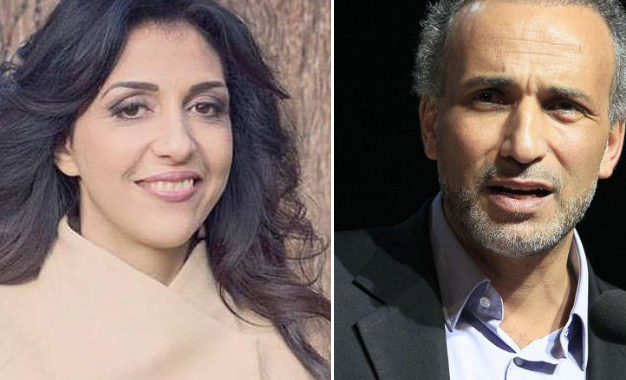Tariq Ramadan Accuser Henda Ayari Corrects Herself
by Hugh Fitzgerald

Henda Ayari, the first woman to have accused Tariq Ramadan of sexual assault, has changed her account of the events that led up to the incident, the French daily Liberation first reported on Wednesday, May 30. Here is the story from Al Jazeera: “Tariq Ramadan’s accuser changes details of rape account,” Al Jazeera, May 30, 2018:
Henda Ayari, the first of four plaintiffs [there are now five, which does not count the four Swiss women whom he tried to seduce when they were his high school pupils] to have accused the Muslim scholar of rape, initially told judges that her encounter with Ramadan took place in March 2012 [she in fact had testified that the rape took place “near the end of March or beginning of April] at the Crowne Plaza hotel in Paris’ Place de la Republique.
Ayari’s latest testimony stated she met Ramadan on May 26, 2012, in a different part of town, namely the Holiday Inn hotel near the Gare de l’Est train station in eastern Paris.
The 41-year-old women’s rights activist said she had thoroughly reviewed all documentation, including a diary she kept which led her to believe the incident had taken place in May and not March.
Ramadan, who has consistently denied the charges, affirmed in previous accounts that he had briefly spoken to Ayari on April 6, 2012, during a Muslim community congress at the Bourget, on the outskirts of Paris.
Asked to comment on the latest revelations, Ramadan’s lawyer, Emmanuel Marsigny called on French justice to react.
“We’ve changed hotels, we’ve changed the date, and soon we’ll change the perpetrator. This is not serious … Justice should open its eyes and deduce the consequence,” Marsigny said.
He added that Henda Ayari was coming out with her second book — “Never More Veiled, Never More Raped”- and no doubt seeking to profit from it.
First, it was Henda Ayari herself who came forward and corrected her own faulty memory, not Ramadan nor his lawyer Marsigny. When in October 2017 she first accused Tariq Ramadan, she was even then unsure of the exact date. She said she thought their violent encounter took place sometime at the end of March or early April; in other words, she already admitted to being somewhat hazy as to the date. Now she says that having gone through all of her diaries, notes, agendas, she realizes that their encounter took place on May 26. That’s about seven weeks later than she had first recalled. Emmanuel Marsigny claims that no one forgets when they were raped. But if no one does forget, then why did he not challenge her initial date, which she said was only “approximate” and she wasn’t even sure whether it took place in March or April?
Isn’t it entirely plausible that someone who had been raped, who had been subject to terrifying and sadistic violence by someone she had so admired, would instead of keeping fresh the memory of this horrific event, would have tried to suppress it? And after those five and a half years, is it implausible that when she tried to remember more or less when it took place, she might have been off by seven weeks? How precisely can you date, after how many years, every major event in your life? I had open-heart surgery more than ten years ago, and you might think I’d remember the date of such a life-or-death event, but not only do I not remember the month or day, I can’t remember the exact year, and must repeatedly be reminded. I have to repeatedly remind myself even of the years certain relatives died. I don’t think I’m alone.
What about Henda Ayari’s misremembering the hotel where the rape took place? She identified it at first as a Crowne Plaza at the Place de la Republique, and now she says it was a Holiday Inn near the Gare de l’Est. These two chains are quite similar in the level of service offered their clientele; today both chains are owned and run by the International Hotel Group; they are very similar in their offerings, with the Holiday Inn brand judged to be just one rung below that of the Crowne Plaza. That similarity explains Ayari’s initial misattribution. Had Henda Ayari first claimed to have been raped at the five-star Crillon or Ritz in Paris, and then changed her story, placing the attack at a budget hotel, say an Ibis or a Novotel, we would be entitled to doubt. But there is little difference, especially to a Frenchman, between the Crowne Plazas and Holiday Inns; mistaking one for the other is entirely understandable.
Ramadan’s lawyer Emmanuel Marsigny seems to find it outrageous, too, that Henda Ayari is about to come out with a book, to make “a profit.” Imagine that — a writer who, in writing a book, hopes to make a profit. What an intolerable idea! And what title do you think Emmanuel Marsigny will give his own future book?
In short, Henda Ayari’s self-correction as to time and place makes sense and does not, as M. Marsigny claims, undercut the gravamen of her charges — which charges, let us repeat, are the same made against Tariq Ramadan, in gruesome detail, by at least five other women in three countries. Having consulted all of her records, Henda Ayari is now able to precisely date both the day of the rape, and the hotel in which it took place.
Of course, there is one more piece of evidence that still needs to be introduced, and which Henda Ayari is no doubt looking forward to: the records of the clients who stayed at the Holiday Inn near the Gare de l’Est, in Paris, on that fateful day, May 26, 2012.
First published in Jihad Watch.